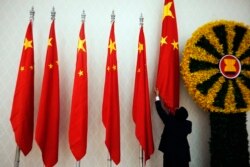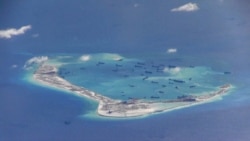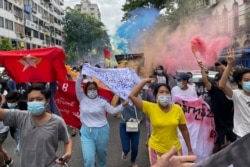Cambodia will hold ASEAN’s rotating chair next year and its diplomatic leadership will be tested by the region’s difficult challenges, while Cambodia will be also be scrutinized for signs that its chairmanship is influenced by its close relationship with China, according to political analysts.
During its third turn at the helm, Cambodia will need to address challenges that divide ASEAN members, such as maritime disputes in the South China Sea and other issues tied to the intensifying U.S.-China rivalry in Asia, while the bloc has yet to respond effectively to the violent political conflict in member state Myanmar.
The United States recently increased diplomacy with Cambodia to ensure that its 2022 chairmanship of the Association of Southeast Asian Nations (ASEAN) takes a balanced approach to U.S.-ASEAN relations and regional challenges, and does not serve China’s international agenda.
U.S. attention for Cambodia’s chairmanship
James Gomez, director at the Asia Center, a Thailand-based think tank, said the U.S. was concerned that Cambodia’s chairmanship could affect the bloc’s internal cooperation and geopolitical position, which has been more or less balanced between the two superpowers.
“As far as ASEAN is concerned, Cambodia is increasingly becoming a vassal state of China,” Gomez told VOA Khmer. “If you do not have some [U.S.] leverage over Cambodia during this period… it could do a lot of damage to the whole grouping and possibly even the neutrality or independence of the grouping vis-a-vis China and the U.S.”
ASEAN’s cooperation is based on consensus, gradualism and non-interference in domestic affairs of its members, which have diverse cultures, political systems and foreign policy interests. Amid China’s growing economic and diplomatic reach in the past decade, many ASEAN countries have sought to carefully balance their individual foreign policies toward the U.S. and China.
Cambodia is among a few Asian countries to have become dependent on Beijing’s diplomatic, economic and military support, while Cambodia also did away with any democratic pretense and reverted to a system of de facto, one-party rule.
Phnom Penh’s relations with Washington have deteriorated since and recently became marred by Cambodia’s ending of U.S. Navy visits to Ream Naval Base. This led to U.S. claims that China is developing a permanent base there, which Cambodia has denied.
U.S. Deputy Secretary of State Wendy Sherman raised these concerns with Prime Minister Hun Sen during a visit in June, but also stressed that the U.S. wants to aid Cambodia’s ASEAN chairmanship and “help ensure it can play a constructive role in addressing critical regional political and security challenges.”
Cambodia could increase ASEAN divisions on South China Sea
Cambodia’s previous chairmanship in 2012 was marked by a historic failure to issue a joint ASEAN statement, due to Cambodian objections to some criticism by other ASEAN members of Beijing’s actions in the South China Sea. Beijing’s relations with Cambodia have only grown closer since, while international tensions over the South China Sea have risen sharply.
“If Cambodia is going to do it again now, I think the damage [to ASEAN] will be even greater,” said Gomez.
China has laid claim to much of the South China Sea and has been expanding its security presence in shipping lanes, and on islands and islets in the past decade. To the anger of Taiwan and five ASEAN members (Vietnam, Indonesia, Philippines, Malaysia and Brunei) who also lay claim to parts of the maritime region.
The U.S. and its Western allies, meanwhile, are also contesting China’s claims and asserting freedom of navigation through the region by conducting naval operations.
ASEAN and China agreed in 2019 to set a timeline for finalizing a Code of Conduct for the South China Sea by 2022, but progress has been slow and China and Southeast Asian claimants remain far apart on key issues.
Cambodian government spokesman Phay Siphan said it would avoid wading into sensitive geopolitical issues and maintain ASEAN’s gradual, consensus-based approach.
“We have no choice but to stand by ASEAN principle of consensus and secondly, not let any outsider intervene,” he said, without explaining who Cambodia considers an outsider to the region.
“And we always call on all parties concerned to not create a violent challenge. Because when there is violence in the South China Sea it affects not only the countries involved, it also affects the region or international community or the world.”
Chheang Vannarith, President of the Asian Vision Institute, said, “Frankly, Cambodia does not want to touch on security issues in the region because security is a sensitive issue and it is difficult to build a consensus [on]. But whether they like it or not, ASEAN member states will raise those issues like the South China Sea conflict."
“It is very difficult for a small country like Cambodia… So there has to be a smart diplomacy so that the ASEAN ship can sail through the US-China storm,” he added.
Cambodia’s leadership to face Myanmar conflict
ASEAN has so far failed to de-escalate deadly political conflict in Myanmar, where the army seized power in February and brutally repressed dissent, only to spark a months-long nationwide uprising and the formation of new armed pro-democracy and ethnic minority forces that seek to oust the coup-makers.
In April, ASEAN’s chair Brunei, with the backing of China, agreed to a “Five-Point Consensus” with the Myanmar Army chief. It entailed a cessation of violence and the army sitting down for a dialogue with the popular anti-coup movement, as well as with powerful ethnic armed organizations. An ASEAN special envoy would be announced to mediate and implement the plan.
Since then, the junta has taken no action to comply with the proposal, while the anti-coup movement, which is led by ousted National League for Democracy lawmakers, rejected talks with a junta that it views as illegitimate.
ASEAN has done little in response and instead, in early June, its Secretariat appeared to offer a veneer of legitimacy to junta leader Min Aung Hlaing by referring to him as “Myanmar’s Leader.” The statement was later taken down and criticized by some ASEAN members.
“Cambodia is in favor of a peaceful settlement without anyone losing their interests as a party to the conflict in Burma,” government spokesman Phay Siphan told VOA Khmer, referring to Myanmar by its old name.
According to Jason Tower, Myanmar country director at the United States Institute of Peace, the June incident indicated that ASEAN’s approach to the crisis had come under the sway of China, which offered similar gestures of recognition to the junta in June and appeared to slow-pedal the appointment of a special envoy.
China has major economic interests in Myanmar and a history of close cooperation with the prior military regime.
“ASEAN has effectively been neutered by China and has lost any ability to effectively address a regional crisis prompted by one of its members,” Tower wrote in an opinion piece in Nikkei Asian Review.
Gomez, the Asia Center director, told VOA Khmer it was unlikely that Cambodia’s 2022 leadership of ASEAN would make any progress in de-escalating the conflict, due to its deference to China and its lack of historical ties or significant trade with Myanmar.
“In that regard, I think Cambodia really will spend this year as a seat-warmer. I don't think you can rely on Cambodia to move anything positively on Myanmar,” he said.







